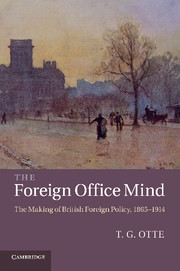Book contents
- Frontmatter
- Contents
- Illustrations (to be found between pages 146 and 147)
- Preface and acknowledgements
- List of abbreviations
- Introduction
- 1 Illusions of supremacy
- 2 The problems of isolation
- 3 Problems of consolidation
- 4 Two Eastern Questions
- 5 The transformation of Great Power politics
- 6 The end of an era
- Conclusion
- Select bibliography
- Index
- Plate section
- References
6 - The end of an era
the late-Edwardian ‘Foreign Office mind’, 1907–1914
Published online by Cambridge University Press: 07 October 2011
- Frontmatter
- Contents
- Illustrations (to be found between pages 146 and 147)
- Preface and acknowledgements
- List of abbreviations
- Introduction
- 1 Illusions of supremacy
- 2 The problems of isolation
- 3 Problems of consolidation
- 4 Two Eastern Questions
- 5 The transformation of Great Power politics
- 6 The end of an era
- Conclusion
- Select bibliography
- Index
- Plate section
- References
Summary
The 1907 convention with Russia removed the principal external complication from British foreign policy: the Asiatic antagonism with Russia. The diminution of Russian power and the concomitant strengthening of Britain’s position in Asia had facilitated the arrangement. In turn, this new departure presented the ‘Foreign Office mind’ with a different set of challenges, that of maintaining relations with Russia on an even keel whilst insulating European politics against any further turbulences created by Russia’s weakness. The shift in the European equilibrium following Russia’s defeat in the Far East had been to the advantage of Germany. The strains in relations with Germany now came to play a more prominent part in the calculations of the Edwardian ‘Foreign Office mind’. At the same time, the internal dynamics of the official mind were shaped by tensions between the Edwardians and the nascent post-Edwardian generation.
‘Dull dogs’: the Hardinge regime and senior appointments, 1907–1913
The changes in British foreign policy were accompanied by, and in turn supported, changes in the composition of the service, now dominated by the Edwardian generation. In the seven years before 1914, the revolving of senior service personnel was less extensive than in the early phase of the Hardinge regime; and, for the moment, it did not affect policy-making. The planned changes around 1914, however, held out the prospect of another reorientation of policy.
- Type
- Chapter
- Information
- The Foreign Office MindThe Making of British Foreign Policy, 1865–1914, pp. 314 - 392Publisher: Cambridge University PressPrint publication year: 2011



